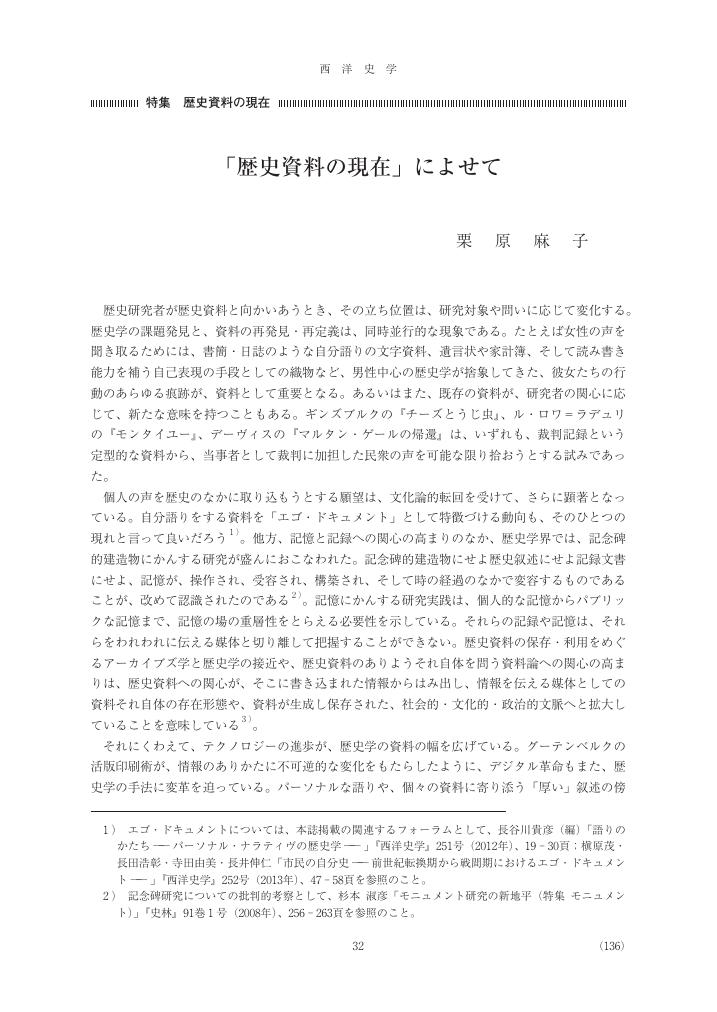7 0 0 0 OA ギリシア(古代,ヨーロッパ,二〇〇八年の歴史学界-回顧と展望-)
- 著者
- 栗原 麻子
- 出版者
- 公益財団法人 史学会
- 雑誌
- 史学雑誌 (ISSN:00182478)
- 巻号頁・発行日
- vol.118, no.5, pp.994-998, 2009-05-20 (Released:2017-12-01)
2 0 0 0 IR 家族の肖像 : 前四世紀アテナイにおける法制上のオイコスと世帯 (特集 家族)
- 著者
- 栗原 麻子
- 出版者
- 史学研究会 (京都大学大学院文学研究科内)
- 雑誌
- 史林 (ISSN:03869369)
- 巻号頁・発行日
- vol.99, no.1, pp.3-38, 2016-01
一九八○年代以降、古典期アテナイのオイコス(家) をめぐる研究は、父系的な氏族支配からポリスの支配へという発展論的理解を脱し、単婚小家族を基盤とするより小規模な世帯へと焦点を移した。本稿においては、そのような夫婦を中心とする世帯を、ポリス法制上の構成単位とみなしうるかどうかについて、とりわけ「空のオイコス(エレモス・オイコス) 」の概念を中心に検討する。その結果浮かび上がるのは、夫のオイコスに対する妻の権利の希薄さである。アテナイ法制上にオイコスの存在を確認できるとすれば、それは夫婦を中心とする世帯というよりは、直系によって継承される系譜上の存在であった。しかるに民衆法廷での家族をめぐる言説は、とりわけ女性を通じて形成される世帯の親愛を示すエピソードに事欠かない。民衆法廷は、法制上のオイコス概念と実態上の世帯の親愛とのあいだを調整する場であったといえる。
2 0 0 0 OA 国家・共同体・家における<母>機能の意義と変遷-<男>を育てる<女>の比較文化史-
- 著者
- 高田 京比子 三成 美保 小浜 正子 田端 泰子 栗原 麻子 山辺 規子 長志 珠絵 河村 貞枝 福長 進 森 紀子 山本 秀行 京楽 真帆子 持田 ひろみ
- 出版者
- 神戸大学
- 雑誌
- 基盤研究(B)
- 巻号頁・発行日
- 2006
アメリカ文学におけるますキュリニティー研究の成果を摂取しながら、日本史・東洋史、西洋史における母 - 息子関係の比較研究を行った。2006年度に3回、2007年度に5回、2008年度に1回の研究会と合宿発表会を持ち、それぞれの研究成果を発表して討論を行った。2008年には「家長権をめぐる<母>機能の比較史」というタイトルで比較家族史学会に於いてミニシンポジウムを行った。
- 著者
- 栗原 麻子
- 出版者
- 京都大学大学院文学研究科
- 雑誌
- 西洋古代史研究 = Acta academiae antiquitatis Kiotoensis (ISSN:13468405)
- 巻号頁・発行日
- vol.14, pp.1-21, 2014-12-18
本論稿では, 前5世紀末から前4 世紀にかけてのアテナイにおける「男らしい」女のイメージについて検討する。「男らしい」女のイメージは, ジェンダー区分を揺るがせ, 「男らしさ」が男性の身体に固有のものではなく社会的な構築物であることを示していた。アリストファネス女性三部作における異性装がもたらす笑いを皮切りに, 女性や女らしさと「アンドレイア(男らしさ=勇気)」の関係について検討するなかで, アテナイ社会が, そのイマジネーションのなかに男勝りの女性の姿を捉えていたことが示されるであろう。とはいえ男らしさの中心は, あくまで戦死者に代表される, 戦場での市民男性固有の勇敢さにあった。アテナイ社会の内側で女性の「男らしさ」が受け入れられる余地があるとすれば, それは家や彼女自身の身体といった女性固有の領域に根ざす場合に限られていたのである。/ In Aristophanic comedies, certain female characters behave like men and men like women. In this study, the representation of and response to the possible existence of manly women in Athens during late fifth and fourth centuries BCE are examined. The concept of female 'manliness (andreia)' could question gender division, thus, leading to the notion that 'manliness' was not inalienable the male body but also a social construction. In the first chapter, the cases of the 'most manly (andreiotate)' leader of the Athenian women, Lysistrata, and the 'womanly man (ho gynnis)', Agathon (the tragic poet), both of whom are regarded as transgressing the gender division, are to be examined along with cross-dressing characters in the three 'women plays' of Aristophanes. In the second chapter, remarks by Platonic Socrates and Aristotle on female manliness are analysed. Both believed that the virtue of manliness is an acquired trait and not something one is born with. However, while Platonic Socrates admitted that both sexes could possess the same 'manliness', Aristotle regarded female manliness as subordinated exerted only in household matters. The third chapter is devoted to individual fictional female figures, whose manliness was either honoured or regarded problematic. The Athenian society was well aware of women's ability to achieve manliness, which is reflected in their imagination of manly women. However, the manly women were scarcely acknowledged within the Athenian civic society when observed through the traditional prism of manly virtue in the battlefield, which was regarded as a significant characteristic of the Athenian male citizens. If female manliness could be depicted desirable, it was definitely restricted to the occasions wherein it was exposed to typical female spheres, such as families, marriages and their own bodies.
1 0 0 0 OA (特集:歴史資料の現在)「歴史資料の現在」によせて
- 著者
- 栗原 麻子
- 出版者
- 日本西洋史学会
- 雑誌
- 西洋史学 (ISSN:03869253)
- 巻号頁・発行日
- vol.268, pp.32, 2019 (Released:2022-05-10)
- 著者
- 栗原 麻子
- 出版者
- 京都大学大学院文学研究科
- 雑誌
- 西洋古代史研究 = Acta academiae antiquitatis kiotoensis = The Kyoto journal of ancient history (ISSN:13468405)
- 巻号頁・発行日
- no.14, pp.1-21, 2014
本論稿では, 前5世紀末から前4 世紀にかけてのアテナイにおける「男らしい」女のイメージについて検討する。「男らしい」女のイメージは, ジェンダー区分を揺るがせ, 「男らしさ」が男性の身体に固有のものではなく社会的な構築物であることを示していた。アリストファネス女性三部作における異性装がもたらす笑いを皮切りに, 女性や女らしさと「アンドレイア(男らしさ=勇気)」の関係について検討するなかで, アテナイ社会が, そのイマジネーションのなかに男勝りの女性の姿を捉えていたことが示されるであろう。とはいえ男らしさの中心は, あくまで戦死者に代表される, 戦場での市民男性固有の勇敢さにあった。アテナイ社会の内側で女性の「男らしさ」が受け入れられる余地があるとすれば, それは家や彼女自身の身体といった女性固有の領域に根ざす場合に限られていたのである。/ In Aristophanic comedies, certain female characters behave like men and men like women. In this study, the representation of and response to the possible existence of manly women in Athens during late fifth and fourth centuries BCE are examined. The concept of female 'manliness (andreia)' could question gender division, thus, leading to the notion that 'manliness' was not inalienable the male body but also a social construction. In the first chapter, the cases of the 'most manly (andreiotate)' leader of the Athenian women, Lysistrata, and the 'womanly man (ho gynnis)', Agathon (the tragic poet), both of whom are regarded as transgressing the gender division, are to be examined along with cross-dressing characters in the three 'women plays' of Aristophanes. In the second chapter, remarks by Platonic Socrates and Aristotle on female manliness are analysed. Both believed that the virtue of manliness is an acquired trait and not something one is born with. However, while Platonic Socrates admitted that both sexes could possess the same 'manliness', Aristotle regarded female manliness as subordinated exerted only in household matters. The third chapter is devoted to individual fictional female figures, whose manliness was either honoured or regarded problematic. The Athenian society was well aware of women's ability to achieve manliness, which is reflected in their imagination of manly women. However, the manly women were scarcely acknowledged within the Athenian civic society when observed through the traditional prism of manly virtue in the battlefield, which was regarded as a significant characteristic of the Athenian male citizens. If female manliness could be depicted desirable, it was definitely restricted to the occasions wherein it was exposed to typical female spheres, such as families, marriages and their own bodies.
- 著者
- 栗原 麻子
- 出版者
- 史学研究会 (京都大学大学院文学研究科内)
- 雑誌
- 史林 = THE SHIRIN or the JOURNAL OF HISTORY (ISSN:03869369)
- 巻号頁・発行日
- vol.99, no.1, pp.3-38, 2016-01-31
一九八○年代以降、古典期アテナイのオイコス(家) をめぐる研究は、父系的な氏族支配からポリスの支配へという発展論的理解を脱し、単婚小家族を基盤とするより小規模な世帯へと焦点を移した。本稿においては、そのような夫婦を中心とする世帯を、ポリス法制上の構成単位とみなしうるかどうかについて、とりわけ「空のオイコス(エレモス・オイコス) 」の概念を中心に検討する。その結果浮かび上がるのは、夫のオイコスに対する妻の権利の希薄さである。アテナイ法制上にオイコスの存在を確認できるとすれば、それは夫婦を中心とする世帯というよりは、直系によって継承される系譜上の存在であった。しかるに民衆法廷での家族をめぐる言説は、とりわけ女性を通じて形成される世帯の親愛を示すエピソードに事欠かない。民衆法廷は、法制上のオイコス概念と実態上の世帯の親愛とのあいだを調整する場であったといえる。
1 0 0 0 IR アテナイにおける卜占
- 著者
- パーカー ロバート 栗原 麻子
- 出版者
- 京都大学大学院文学研究科
- 雑誌
- 西洋古代史研究 = Acta academiae antiquitatis kiotoensis = The Kyoto journal of ancient history (ISSN:13468405)
- 巻号頁・発行日
- no.17, pp.1-13, 2017
栗原麻子訳tr. by Asako KURIHARA
- 著者
- 栗原 麻子
- 出版者
- 史学研究会
- 雑誌
- 史林 (ISSN:03869369)
- 巻号頁・発行日
- vol.99, no.1, pp.3-38, 2016-01
1 0 0 0 OA 東地中海周辺域における都市共同体と儀礼
1 0 0 0 OA 「マスキュリニティ」の比較文化史-公私関係の再検討に向けて
- 著者
- 三成 美保 栗原 麻子 福長 進 山本 秀行 高田 京比子 京樂 真帆子 長 志珠絵 森 紀子 山辺 規子 河村 貞枝 井出 千春 沖野 真理香 田端 泰子 小浜 正子 田端 泰子
- 出版者
- 摂南大学
- 雑誌
- 基盤研究(B)
- 巻号頁・発行日
- 2009
「マスキュリニティの比較文化史」につき、3点を明らかにした。(1)「マスキュリニティ史」は「男性史」とは区別されるべきであり、ジェンダー史の一領域として「歴史学におけるジェンダー主流化」を牽引する重要な役割を果たす。(2)「マスキュリニティ」は多様であり、男性の属性とは限らない。「覇権的/従属的マスキュリニティ」の差異化は、時代と社会により異なる。(3)「同性愛」概念は19世紀に登場し、私的な同性愛関係はしばしば公的領域(政治・経済・軍隊)の人的紐帯を決定した。
1 0 0 0 OA リュクルゴス時代の公私間係アッティカ法廷弁論の通事的考察をめざして
法廷弁論家であり、また前4世紀後半のアテナイ政治を主導する政治家の1人でもあったリュクルゴスに焦点をあて、ヘレニズムへの転換期における公と私の関係性について検討した。とりわけ、リュクルゴスの政策における公私の関係性を理解するために(1)エイサンゲリア(弾劾裁判)の多用、(2)私的復讐と公的刑罰の区別の2点について分析し、市民生活のなかの公共的要素をリュクルゴスが重視していたことを明らかにした。そのポリス共同体イメージは、アテナイ社会に伝統的な互酬的価値観のもとに、アプラグモシュネ(消極主義)的な市民像を取り込んだものとして理解できる。

